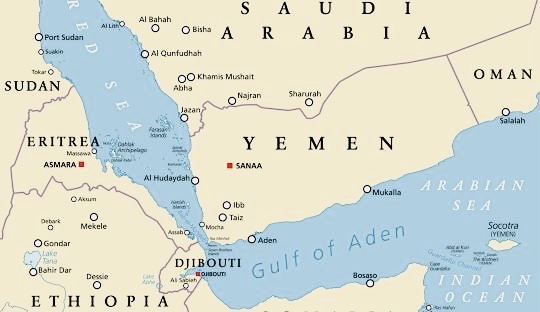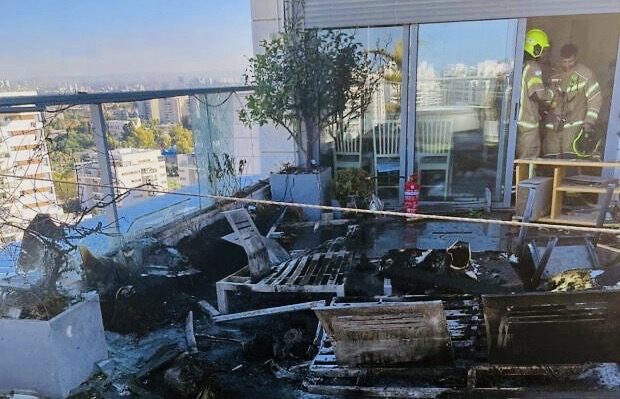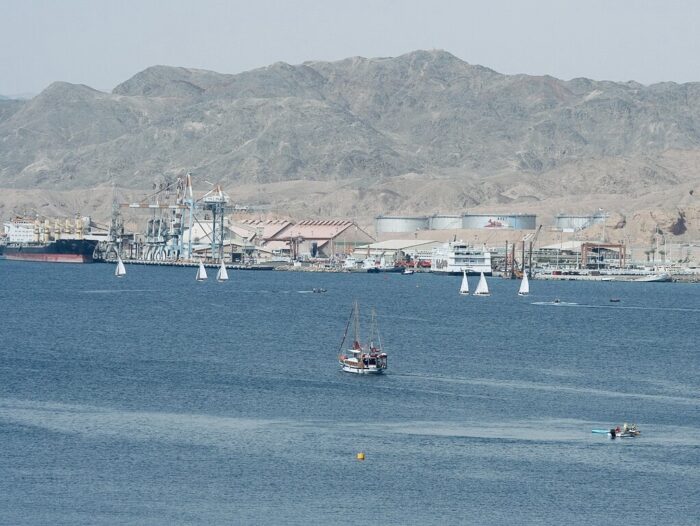The Houthis of Yemen have morphed into one of Israel’s most relentless and resilient enemies.
In the past year, in a demonstrable show of solidarity with the Palestinians of the Gaza Strip, they have attacked Israel on a regular basis with missiles and drones.
As well, the Houthis have targeted cargo ships plying the waters of the Red Sea and the Gulf of Aden, thereby bringing the United States and its Western allies into the conflict.
Most recently, they fired on three American owned, operated, and flagged merchant vessels and two U.S. Navy destroyers, the USS Stockdale and the USS O’Kane, as they transited the Gulf of Aden. No injuries were reported, nor were the vessels damaged.
Yemen, a member of the Arab League, has been hostile to Israel since its birth in 1948. Yemen, however, has not clashed directly with Israel.
The Houthis, a rebel group from northern Yemen and a proxy of Iran, have broken that mould.
A Zaydi Shi’a Islamist political and military organization, the Houthis emerged in the 1990s and have been a major player in Yemen’s current civil war.
They began striking Israel and interfering with Israeli and international shipping following the outbreak of the Israel-Hamas war in Gaza in October 2023. Houthi leader Abdel-Malik Al-Houthi has said they will continue carrying out attacks in support of the Palestinians until “the Israeli aggression in the Gaza Strip ceases.”

The Houthis, whose inflammatory credo is “Death to America, death to Israel, curse be upon the Jews, victory for Islam,” are opposed to Israel’s existence on ideological grounds. And they are shamelessly antisemitic, refusing to conceal their animus of Jews in standard anti-Zionist slogans.
The Houthis’ antisemitism flares despite the absence of a Jewish community in Yemen. Forty five thousand out of 46,000 Jews left Yemen in 1949, having been airlifted to Israel in Operation Magic Carpet. Since then, Yemen’s few remaining Jews have emigrated, the vast majority having resettled on Israel.

Given their deep-seated hatred of Israel and Jews, the Houthis have positioned themselves on the front lines of the Arab/Iranian rejectionist struggle against the Jewish state. By their own count, they have attacked 193 ships and have launched more than 1,000 missiles and drones at their enemies in the past 14 months.

It is worth mentioning in passing that the Houthis, in a manner of speaking, are emulating Egypt. Egyptian President Gamal Abdel Nasser blocked the entrance of the Straits of Tiran in 1956 and 1967 in an effort to interfere with the passage of Israeli vessels bound for the Red Sea and beyond.

One can assume that Israel and international shipping in the Red Sea will continue to be in the Houthis’ crosshairs for some time to come. The reason is clear. Israel is still in the throes of conducting its military campaign in Gaza, and is likely to remain there indefinitely to ensure that Hamas does not regain its political and military footing.
The aggressive Houthi campaign of interference with shipping has compelled the owners of cargo vessels to avoid the Red Sea and the Bab al-Mandeb Strait, which is situated between Yemen and the Arabian Peninsula and leads to the Suez Canal in Egypt.

Suez Canal revenues have plummeted by 70 percent, depriving the Egyptian government, its proprietor and operator, of revenue at a moment of budgetary constraints.
Houthi attacks have forced global shipping companies to divert merchant ships to the far longer and more expensive route around the Cape of Good Hope at the tip of Africa.
This has contributed to inflation and higher prices for consumer goods.
Objectively speaking, the Houthi bombardment of Israel from a great distance has largely failed due to the fact that nearly all their missiles and drones have been downed. Yet they keep trying to beat Israeli defences, judging by their latest attempts to strike targets throughout Israel.
On December 1, they launched a surface-to-surface ballistic missile at a “vital target” in central Israel. It was shot down by the Arrow defence system, but four Israelis were injured as they ran for shelter. A fifth person was treated for acute anxiety, the Magen David Adom emergency service reported.
On December 9, a Houthi drone crashed into the balcony of a penthouse apartment in Yavne, a town between Tel Aviv and Ashdod, resulting in damage but no injuries.

On December 11, Israel intercepted a Houthi drone over the Red Sea near its port of Eilat.
The following day, Houthi spokesperson Yahya Sarea announced that the Houthis, in cooperation with the Islamic Resistance in Iraq, had fired drones at Ashkelon and Jaffa.

Last July, a Houthi drone struck an apartment building in central Tel Aviv, killing a middle-aged man.
Two months later, the Houthis launched a drone at Ben-Gurion Airport shortly after Prime Minister Benjamin Netanyahu’s plane landed.
In retaliatory strikes in July and September, Israel bombed the Yemenite port of Hudaydah, causing considerable destruction to its facilities.
Although Israel has shot down virtually every Houthi missile and drone, the Houthis appear to have crippled operations in Eilat due to the dearth of ships entering the Red Sea.
“They have inflicted serious damage on the Israeli economy by almost completely paralyzing the port of Eilat, which is Israel’s main station for the movement of goods to and from the Far East,” the Begin-Sadat Center for Strategic Studies says in a recent report.

According to a Bank of Israel study, the Houthi blockade of the Bab al-Mandeb Strait has not caused any great economic distress to Israel. “The impact on Israel is marginal to non-existent, due to Israel’s intensive trade with Europe, which is not affected by the blockade of the straits,” says the report.
While Israel and the United States have inflicted severe blows on the Houthis, they have not been deterred, having been buoyed by their membership in Iran’s Axis of Resistance.
This network of anti-Israel organizations has been weakened of late by Israel’s military campaigns in Gaza and southern Lebanon, its assassination of their leaders and commanders, and its aerial bombardment of Iran’s anti-aircraft batteries.
By all accounts, these developments emboldened Islamist rebels in Syria to launch a stunning offensive, which led to the sudden downfall of Syrian President Bashar al-Assad, a charter member of the Axis of Resistance.
Whether or not the Houthis have been affected by these historic events is debatable, but they have carried on as usual with their attacks against Israel and international shipping.
The Houthis believe they can attack international shipping, U.S. regional allies like Israel and American naval ships with impunity, says the Institute for the Study of War, a U.S. think tank.
“The Houthis now pose a strategic threat with global implications for the United States and its allies. The United States … failed to prevent Iran from strengthening the Houthis’ military capabilities. The Houthis have grown from a small militia in Yemen’s northern mountains into a major strategic threat with ties to multiple U.S. adversaries.”
In its estimation, the United States erred in seeking deescalation with the Houthis. Furthermore, U.S. “reactive half-measures” have failed to materially degrade Houthi military capabilities.
Mike Knights, a senior fellow at the Washington Institute for Near East Policy, thinks that the Houthis have been on something of a roll since the outbreak of the Israel-Hamas war.
“The Houthis are stronger, more technically proficient, and more of a prominent member of the Axis of Resistance than they were at the war’s outset,” he wrote recently. “The Houthis have arguably weathered the year of war without suffering major setbacks … and delivered the best military performance of all the Axis of Resistance players.”
The Houthi leader, he added, is even being considered by Iran as a successor to Hezbollah’s late secretary general, Hassan Nasrallah, who was killed by an Israeli air strike in Beirut this past September.
True or not, the Houthis believe they have become a key component of the Axis of Resistance, which Israel has managed to degrade considerably in the past few months.
